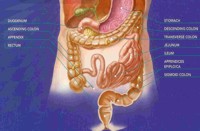

A Colonoscope is a long flexible tube that is about a third of an inch in diameter. It is passed through the back passage (anus) into the large bowel (colon) and allows the physician to examine the lining of the large intestine. Abnormalities suspected because of abdominal pain, diarrhea, constipation or bleeding from the bowel could be investigated. In addition, lesions suspected on X-ray can be confirmed and abnormalities may be detected which are too small to be seen on X-ray. If the doctor sees a suspicious area, he can take a small piece of tissue (a biopsy) for examination in the laboratory. Biopsies are taken for many reasons and do not necessarily imply cancer. Polyps are benign growths or tumors, which can turn to cancer they become larger. Large polyps can be cancerous and removing them at the time of colonoscopy prevents the spread or development of advanced cancer.
Many problems of the colon can be diagnosed by colonoscopy. Colonoscopy is more accurate than X-ray in detecting large bowel problems, but X-ray examination of the large bowel may be complementary and useful when colonoscopy is not possible or incomplete. Colonoscopy may detect early cancers too small to be seen by X-ray and can confirm the diagnosis by biopsies and brushings. Colonoscopy is the most sensitive way to look for early lesions in patients at high risk of developing cancer (e.g. family member with colon cancer or polyps, patients with chronic Ulcerative Colitis) or to check patients who have had a previous cancer removed surgically. Colonoscopy is an extremely worthwhile and safe procedure that is very well tolerated and is invaluable in the diagnosis and proper management of disorders of the large bowel.
The procedure is extremely well tolerated with little or no discomfort. However, some patients who are extremely sensitive or who have a loopy large bowel or severe diverticulosis may experience more discomfort and will require sedation. If sedation is required, it will be given directly into an arm vein. If you feel uncomfortable during the test it may be due to the air used to inflate the bowel or advancing the instrument around looped or twisted areas of the bowel. The procedure usually takes 5-30 minutes. Major effects of the sedation wear off in about one hour.
Colonoscopy is safe and is associated with very low risk when performed by physicians who have been trained and are experienced in this procedure. Complications can occur but are rare. Local discomfort usually disappears at the end of the procedure. Bleeding may occur from the site of biopsy or polyp removal. Perforation (a small hole in the lining of the bowel) may also occur rarely. These complications are usually mild but rarely may require blood transfusions or surgery.
Your pulse, respiration and blood pressure will be checked. If you receive a sedative, you will be kept in the office until most of the effects of the medication have worn off. You will be able to resume your normal diet after the colonoscopy unless you are instructed otherwise. If you have had sedation, you will not be able to drive for the rest of the day and will require someone to take you home or to take taxi.
(Driving after you have received a sedative is illegal, and if you are in an accident your auto insurance may not cover it.) Even though you may not feel tired, your judgment and reflexes may not be normal. Do not plan to go back to work after having sedation.
You will be asked to sign a consent form on the day of your procedure.